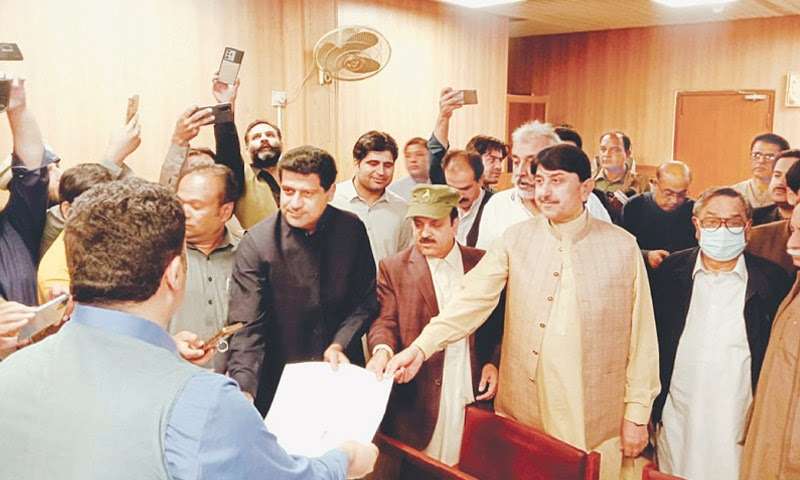As the electoral clock ticks down, Balochistan finds itself once again in the throes of its traditional pre-election, unending political saga, a political flurry where politicians change allegiances like changing seasons.
The intricate web of political affiliations and divisions is unraveling, painting a dynamic picture of the province’s ever-evolving political landscape. This recurring ritual highlights Balochistan’s political flux, raising questions about the long-term effectiveness of such transitions.
Navigating Alliances in Balochistan
Sardar Ayaz Sadiq’s visit to Quetta served as a catalyst for political realignments. A notable number of ministers and parliamentarians from the Balochistan Awami Party (BAP), who served in the previous assembly, extended their support to him. What’s intriguing is that this gathering was not confined to those affiliated with BAP but also included figures who had distanced themselves from the province’s political arena. Among the attendees were political heavyweights like Sardar Abdul Rahman Kethran, Muhammad Khan Lashari, Sardar Masood Loni, Noor Muhammad Dummar, Muhammad Khan Toratman Khel, and Dr. Rabbia Baloch.
Sardar Abdul Rahman Kethran’s political journey is a testament to his flexibility and resilience. Having held key ministerial positions in various governments, he has been elected to the Balochistan Provincial Assembly from PB-8 Barkhan on five separate occasions, each time representing different political parties.
His wife, Sardar Kethran, made history by becoming the first female member of the Balochistan Assembly in the 2008 elections. Sardar Abdul Rahman has been a prominent figure both in opposition and in government, belonging to parties such as JUI, PML-N, PML-Q, JI, and BAP.
Haji Muhammad Khan Lehri, who entered the Balochistan Assembly in 2013 on a PML-N ticket, played a crucial role in orchestrating a vote of no confidence against then-Chief Minister Nawab Sanaullah Zehri. In 2018, he aligned himself with the newly formed political entity, BAP, while remaining vocal in his criticism of his own party leader, Jam Kamal, during the vote of no confidence.
Dr. Rabbia Balidi, a member of BAP, has held multiple positions in the previous government, including parliamentary secretary for health, law and parliamentary affairs, science and technology, and chairperson of the Assembly Women’s Caucus.
Mir Abdul Kareem Nosherwani, elected for the first time in 1985 from Kharan, has consistently won from Khuzdar, representing PPP, BNM, and PML-Q in different tenures.
Mir Dostain Domki, an independent candidate, entered the National Assembly from Sibi, Kohlu, Dera Bugti, and Harnai NA-265 in 2013.
Sardar Masood Loni, secured his place in the Balochistan Assembly in 2018. In 2013, Mir Majeeb-Ur-Rehman Mohammad Hasni of the National Party represented Washuk.
Diverse opinions and changing party allegiances are integral to the democratic process. Notable names like Nawab Aslam Raisani have maintained their traditional constituencies while switching party affiliations, transitioning from PPP to PTI, BAP, and most recently, JUI. Similarly, seasoned politicians like Nawabzada Lashkari Raisani have consistently represented Balochistan in the upper house of parliament as senators for various parties, including PPP, PML-N, and BNP.
While this shifting landscape is common across the country, Balochistan presents unique challenges. Low voter turnout can be attributed to economic hardships and a lack of trust in the political establishment. However, there may be underlying factors specific to Balochistan at play.https://thebalochistanupdates.com/nawaz-sharif-return-a-critical-analysis/
Balochistan has also seen the emergence of figures like Baber Yousaf Zai, who have contributed significantly to various political entities. They navigate the political arena, aiming to advance their personal interests and positions, much like their predecessors, including Imran Khan, Sardar Rind, Mir Abdul Qudoos Bizenjo, and others, who have left their mark on the province’s political landscape.
The legendary Sindhi literary figure Sheikh Ayaz once stated that a dog remains loyal until it goes mad, while a human remains loyal until he becomes crazy. It is now in the hands of loyal voters to decide. When we consider this concept of ‘madness,’ we find that a significant portion of Balochistan’s registered voters, out of 5,284,594, do not exercise their right to vote. Among the remaining 5.2 million voters, a striking 84,594 about 2.6 million people are either impassioned or unaware.
Amidst these shifting alliances, one may wonder if the Balochistan National Party-Mengal (BNP-M) stands as the only true ideological party in Balochistan. While disagreements with the BNP’s policies are entirely valid, it’s important to recognize that, from the leader of the BNP to its members, there exist deep-rooted ideological convictions. Differences in opinion are the essence of democracy, but failing to acknowledge the BNP’s genuine ideological stance while characterizing other parties as mere political players would be a disservice to the province’s political diversity.


